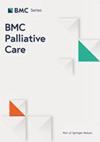为阿巴拉契亚农村地区的心力衰竭患者和家庭照护者提供姑息关怀:随机对照试验
IF 2.5
2区 医学
Q2 HEALTH CARE SCIENCES & SERVICES
引用次数: 0
摘要
心力衰竭(HF)是一种使人衰弱的疾病,症状不断恶化,给家庭护理带来沉重负担。心力衰竭影响着 800 多万美国人。西弗吉尼亚州是美国心力衰竭死亡率最高的地区,但医疗保健服务有限。本研究测试了家庭高血压姑息治疗和临终关怀干预(FamPALcare)是否能在 3 个月和 6 个月的研究终点改善患者和护理人员的预后。本研究采用随机对照试验设计。高血压患者及其护理人员被随机分配到干预组(21 人)或对照组(18 人)。干预措施包括五次电话辅导,内容涉及高血压家庭护理、姑息治疗和临终关怀。在基线、3 个月和 6 个月时收集的结果数据来自患者的(a)高血压相关健康状况和抑郁/焦虑量表评分;护理人员的(b)护理负担和抑郁/焦虑量表评分;以及(c)干预参与者完成的 11 项 FamPALcare 帮助量表的匿名评分。患者的平均年龄为 65.66 岁(SD = 13.72),67% 为白人男性。护理人员的平均年龄为 62.05(标准差 = 13.14)岁,77% 为白人女性。与对照组相比,干预组患者的高血压相关健康状况得分明显更高(p < .05),在研究终点 6 个月时的抑郁/焦虑得分更低。干预组的家庭护理人员在 3 个月时的护理负担(p < .05)和抑郁/焦虑(p < .01)得分明显较低。平均帮助评分为 M = 4.46(满分 5 分)(SD = 0.49)。研究发现,FamPALcare 干预疗法能有效改善患者与高血压相关的健康状况,减轻护理人员的负担,改善患者和护理人员的抑郁和焦虑评分。研究发现,FamPALcare 高血压干预措施是可行的,并且能够持续实施(保真度)。FamPALcare 干预的成本效益和有用性评级信息将用于规划后续临床试验。ClinicalTrials.gov NCT04153890,注册日期:2019年11月4日,https://clinicaltrials.gov/ct2/show/NCT04153890 。本文章由计算机程序翻译,如有差异,请以英文原文为准。
Palliative care for patients with heart failure and family caregivers in rural Appalachia: a randomized controlled trial
Heart failure (HF) is a debilitating disease with worsening symptoms and family caregiving burden. HF affects more than 8 million Americans. West Virginia has the highest HF death rate in the U.S. and limited healthcare services. This study tested whether the family HF palliative and end-of-life care intervention (FamPALcare) improved patient and caregiver outcomes at 3- and 6-month study endpoints. This study used a randomized controlled trial design. Patients with HF and their caregivers were randomly assigned together to the intervention (n = 21) or control (n = 18) group. The intervention included five telephone coaching sessions on the HF home, palliative, and end-of-life care. The outcome data collected at baseline and at 3 and 6 months were from the patients’ (a) HF-related health status and depression/anxiety scale scores; and from caregivers’ (b) caregiving burden and depression/anxiety scale scores; and (c) anonymous ratings on the 11-item FamPALcare helpfulness scale, completed by the intervention participants. The mean age of the patients was 65.66 (SD = 13.72) years, and 67% were White males. The mean age of the caregivers was 62.05 (SD = 13.14) years, and 77% were White females. Compared to the controls, patients in the intervention group had significantly greater scores for HF-related health status (p < .05) and lower depression/anxiety scores at 6 months, the study endpoint. The family caregivers in the intervention group had significantly lower scores on caregiving burden (p < .05) and depression/anxiety (p < .01) at 3 months. The mean helpfulness rating was M = 4.46 out of 5 (SD = 0.49). The FamPALcare intervention was found to be effective at improving patient HF-related health status and reducing caregiver burden and improving both patient and caregiver depression and anxiety scores. The FamPALcare HF intervention was found feasible and consistently delivered (fidelity). The FamPALcare intervention’s cost-effectiveness and helpfulness ratings information will be used to plan for subsequent clinical trials. ClinicalTrials.gov NCT04153890, Registered on 4 November 2019, https://clinicaltrials.gov/ct2/show/NCT04153890 .
求助全文
通过发布文献求助,成功后即可免费获取论文全文。
去求助
来源期刊

BMC Palliative Care
HEALTH CARE SCIENCES & SERVICES-
CiteScore
4.60
自引率
9.70%
发文量
201
审稿时长
21 weeks
期刊介绍:
BMC Palliative Care is an open access journal publishing original peer-reviewed research articles in the clinical, scientific, ethical and policy issues, local and international, regarding all aspects of hospice and palliative care for the dying and for those with profound suffering related to chronic illness.
 求助内容:
求助内容: 应助结果提醒方式:
应助结果提醒方式:


